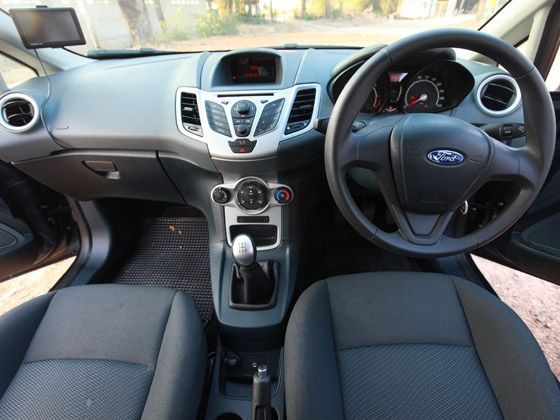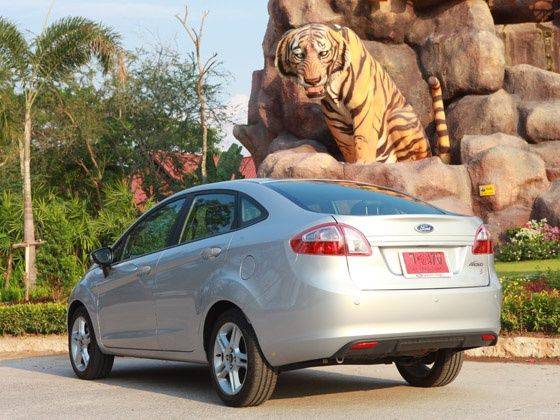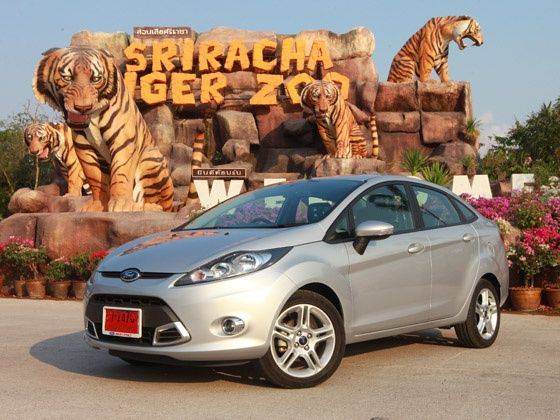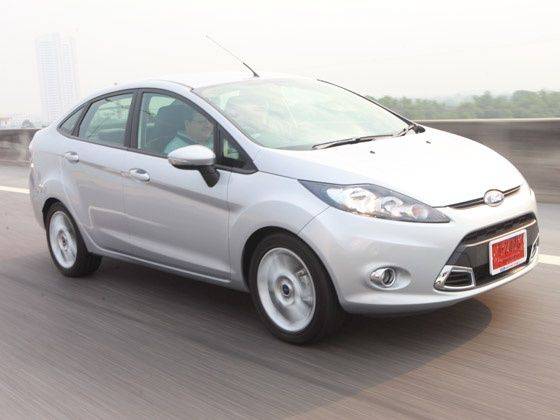What does one do when on to a winning streak but you already have a player with the same name as your possible new signing? Well if you are Ford and know that you are onto a good thing and also basking in the glory of fun and Figo, you can very well go and have another Fiesta! Seriously, that's the line of thinking which Ford India is very much clued in with the B299 version of the Fiesta which is sold the world over primarily in hatchback configuration and specifically as a saloon in emerging and price sensitive mass markets

The signs for, and from, Ford India for new additions to its model portfolio have been evident ever since the Figo began garnering rave acclaim and commercial success and this must have played a small but significant role in getting the Blue Oval to commit to India. This is what the world at large tends to look at and zero in on but a sector like the automotive industry is characterized by long lead times for development and production engineering. However, much one might suggest that the Figo is Ford India’s first ever block buster and therefore the new model development programme has been okayed by the bean counters in Detroit, it is anything but that.
Pointers to this growth story come by way of the dedicated engine line set up at Ford’s facility near Chennai to make both the Duratech and Duratorq petrol and diesel two years ago and if that was not all further enhancements were made to upgrade both processes and production capability. In line with other OEMs gearing up for a burgeoning Indian market, Ford had already taken the decision to begin to accord the Indian market, not just the commitment but also realize its importance as a commercial hub in sync with its future global gameplan.

Future global gameplan as evinced and scripted a couple of years ago got a fillip with Ford CEO Alan Mulally’s trip to India to unveil the Figo but major background work done by the product planners for Ford’s Asia-Pacific operations has now brought Ford India in line with the other Ford operations in this region. Mulally’s “One Ford” terminology is also a global manufacturing and sales war cry for the Blue Oval and with the present generation Ford Fiesta (presently manufactured and sold globally) coming to our roads in August 2011, India will finally be part of the One Ford family in spirit and in reality.
The most obvious question is how confusing could it get with a Fiesta already in the line-up and a new one with the same name poised for launch within the next few months. Well this is one for the Ford India product planners and marketing team to sort out because both will continue to operate and hopefully proliferate given that Ford has just discontinued production of its long standing war horse, the Ikon. This provides both maker and model the ideal opportunity to slip into the role played by the Ikon and this could be prudent thinking should Ford get the dynamics of the pricing and positioning game right.

Bring us then to the new Fiesta, code name B299, one of the recent success stories the Blue Oval has had worldwide. Not since the Fusion has Ford India had a model in its armoury which was contemporary and given that the B299 Fiesta has been a recent act in the Asia Pacific region and continues to command strong sales all over the world, this stonking best seller is one of the eight cars penciled in by Ford for introduction in India in the first half of this decade.
Built in both sedan and hatchback versions, Ford India suggests that this would be a premium offering and given its slinky dragon eyed look up front, the new Fiesta looks purposeful yet has a bit of mischief lurking in the way its entire form flows from front to rear. Of course the key to the new Fiesta’s design was always intended to go with the markets it was aligned with and the hatchback evolved as a logical conclusion of this line of thought. As with most global car makers focused on grabbing a slice of the China pie, the latest generation Fiesta was also developed as a sedan, thereby enhancing the model range but yet keeping Ford’s Kinetic design language right in sync.

Ford has penciled in the sedan version to come to India this year (with the hatchback destined to follow, sooner rather than later) and that is what I got to drive on a short flying trip to Thailand recently. The first thing which is apparent is that this Fiesta gets away from all previous Ford models seen in India in its overall style and turnout. The boldest and clearest view as yet of Ford’s kinetic design language which pervades across its global model range, the new Fiesta is dynamic in its stance and looks best in its front three-quarter angle and also from head-on but there surely is a bit of awkwardness when one takes in the rear section. Given that both sedan and hatchback share the same wheelbase, the upswept kink from the glazed area, especially at the rear contributes to this kicked up look. However, what is of greater import is that the Fiesta overall is pretty pleasing in its makeup and turnout.
The distinctive front end replete with its tenuous stretched stance conveys both modernity and purpose and those dragon eye headlamps along with the thin sliver of a front grille ramps up the excitement quotient. Add to that the large stylized opening in the front bumper along with those recessed fog lamps and the chrome-surround grille inserts, there is a lot of visual drama packed in the front end of this Fiesta. Natural this because apart from China, the Fiesta is a major seller for Ford in the ASEAN region and having lashings of chrome and slinky cats eye elements packaged into the product helps proclaim the Fiesta as a natural for its habitat.

In sync with its purposeful front end, the rakish A-pillar plus the character crease running from just behind the front wheel arch right through to the swoopy C-pillar holds the game together for this Fiesta and the party continues with those flat machined wheel arch surrounds. The rear is probably the weakest detail in the overall design and it comes across as pretty dowdy for what seems a most compact and exciting package.
This line of thought goes right out of the window once you step into the cabin and it is a whole new funky world out there. The dashboard is a large and swoopy appendage into which the various instrument pods and central console seem to exude character in a dramatic manner. The chrome theme is very much in evidence here but resting on a large dark background this interplay works well. However the quality of the dashboard plastics and certain other details would have to be definitely enhanced if it has to make its “premiumness” felt in a segment already getting crowded with cars seeking that very edge. Also given its hatch proportions and conformity of wheelbase, the interior is a bit cramped especially at the rear and this would be a real challenge for a car which has to take on the likes not just of the Honda City but also the brilliantly conceived Volkswagen Vento.

Equipment levels seems to be all right there but then driving a Thai-market version with all the bells and whistles is one thing and what appears as a fully loaded Indian version could yet be a watered down version so we will not get into this yet. Nevertheless from the driver’s perspective, the seating position is well optimized and there is a good balance of tactility and ergonomics with the controls well defined and easy to get to in a natural sort of way. I think the overall turnout of the interior is brilliant to look and comprehend but all the style and the drama also disguises the fact that there isn’t much by way of cubby holes for storage. With rear space compromised by using the same wheelbase floorpan of the Fiesta hatch, the sedan does seem to be short on leg room and headroom for the back benchers and against rivals like the City and Vento this is going to be pretty critical.
One way the Fiesta can make up for all its relative missing bits is in the manner the car handles, rides and drives. Dynamically I have no hesitation in stating that this car carries the strong handling traits of the present day Fiesta and Figo and builds on them in large measure. Key to its complete repertoire of good road manners has to start with the stiff yet light structure which is where the car really begins to distinguish itself. A combination of high tensile, low-weight steel panels and manufactured blanks helps the super structure with just the right torsional stiffness without adding more weight to the overall package. Throw in a set of conventional suspension elements finely tuned for a good ride without compromising on handling and the Fiesta is a lively but very predictable creature one would want to go driving in.

Given that our test route wasn’t demanding in the least with a straight run from Bangkok to Rayong where the AutoAlliance Thailand facility is located, the Fiesta impressed with its manners and rode in a composed manner with fluid movements matched with precise directional ability. This Fiesta incorporates electric-assist to its steering gear and I was pleasantly surprised with the quality of its feel and weightage. The weight distribution as well as the power to weight aspect seemed perfectly in sync with the 1.6-litre, 120bhp motor this Fiesta came equipped with and we drove cars with both a manual 5-speed gearbox as well as the 6-speed PowerShift automatic transmission. There are no plans, as yet, to bring in the twin clutch PowerShift tranny but the 5-speed manual (the very same IB5 unit as does duty in the present-day Indian Fiesta) complements the smooth torque thrust from the new 1.6-litre motor and delivers big on linear thrust, both in cruise as well as in max attack modes.

This Fiesta in India will also be offered with the option of a diesel engine under its bonnet and this could be a further adaptation of the present day 1.6-litre Duratorq which is a proven performer. There could also be another petrol motor, a slightly smaller 1.4-litre unit but that has as yet not been confirmed but then he right choice of powerplant for the new car has to be the 1.6-litre petrol engine (the same as does duty in the present day Fiesta) but which now utilizes twin independent variable camshaft timing to liberate more horses from the same displacement. The added power and torque is matched with new smile inducing response levels as the car displays an urge to sprint forward at the slightest caress of the throttle pedal and given its optimum footprint, the strong levels of grip and handling mark this baby out as probably the most fun-on-wheels offering from Ford in India.
However, in its class it will need to deliver sense and sensibility where overall performance appeal has to be matched with practicality, refinement, fuel efficiency and of course a price point in sync with the competition. Positioning the new Fiesta will be a real challenge as I outlined at the very beginning and the price-package proposition is linked to this. How well Ford manages to carry itself over this minefield will determine whether a dynamically brilliant car can also become the standard bearer in class. Answers in a couple of months so stay tuned.









No comments:
Post a Comment